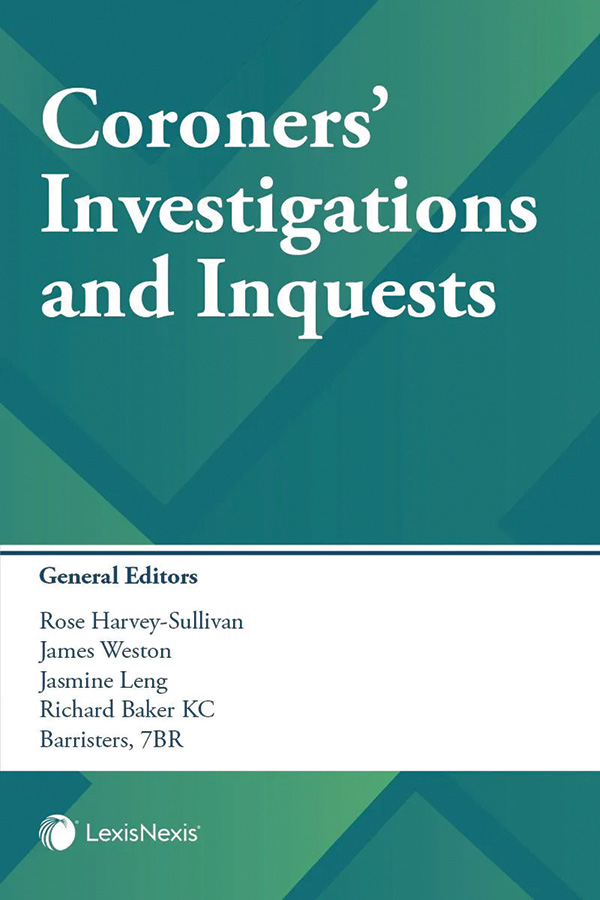
“Its practical focus will remain most useful to the less specialist advocate, but it is has much to offer the more seasoned practitioner”
- Editors: Rose Harvey-Sullivan, James Weston, Jasmine Leng, and Richard Baker KC
- Publisher: LexisNexis Butterworths
- ISBN: 9781474333269
- RRP: £175.00
Coroners’ Investigations and Inquests is the second edition of a work originally published in 2021. Edited by a team of barristers from 7 Bedford Row, it is explicitly aimed at practitioners representing interested persons in coronial investigations, and is intended to be accessible and practical. Its scope ranges well beyond the inquest itself to many aspects of the coronial investigation, from its commencement all the way through to applications for judicial review and reports to prevent future deaths. It is logically and thoughtfully subdivided by topic and, supported by a good index, is readily accessible, providing both commentary and, in an appendix, the most important of the relevant statutory materials.
Pithy & practical
The volume has grown in size since the first edition, and while shorter than some alternatives, it is of sufficient length for its intended purposes. Despite the number of contributors, it is cohesively written, with a practical focus. Excerpts from case law remain generally succinct and to the point. The intended readership being legal practitioners, the balance of the material covered naturally leans heavily towards topics more central to the role of the advocate. Issues of more specific concern to coroners, such as notification and certification, are quickly covered. This leaves room for the discussion of issues commonly faced by the advocate at inquest, together with a number of ancillary issues such as costs, funding and publicity.
Among its strengths are the pithy chapters on particular types of inquest—from mental health, clinical and prison deaths to less frequently explored issues of product-related death and military inquests. These are sensibly chosen, helpfully structured, and will assist the practitioner by setting out the current state of the law and offering advice on commonly encountered issues—such as considerations of risk management in cases of deaths in custody, or the deceased’s mental capacity where a death has occurred following clinical treatment. For those new to these types of inquest, this will be invaluable. Even more seasoned practitioners will benefit from standing back and looking afresh at these questions thematically.
The second edition provides useful additional chapters on inquests concerned with maternity, the police and social care contexts. The key developments in the law relating to the application of the European Convention on Human Rights are covered in a helpful and accessible manner, and there is reference to recent material including the chief coroner’s guidance for coroners on the bench, published in January.
Wider questions
There are inevitably times when such a practical style can have its limitations. Wider questions, such as the principles behind the construction of the present statutory architecture, are identified more through their application than their origin. Thus, the section on the requirement to empanel a jury in inquests arising from reportable deaths helpfully lists them, without discussing the piecemeal way the law has developed, which would inform submissions on the coroner’s discretion to sit with a jury, where not mandated to do so. Similarly, there is reference to the questioning of witnesses, and in particular the guidance provided by the Bar Standards Board and others to avoid hostile and aggressive questioning, published in 2021, without much discussion of it. The experience of coroners is all too often that questioning of witnesses who are themselves affected by the circumstances of the death can be unnecessarily and insensitively robust, sometimes seeking to trespass on areas outside of the scope of the investigation. The work rightly identifies the fact that no one within an inquest is on trial, least of all the deceased, but would benefit from a more explicit exploration of what the right to ‘examine’ a witness actually means, and most particularly that there is neither a right nor a duty to conduct a cross-examination.
All in all, Coroners’ Investigations and Inquests is an accessible and up to date revision of a useful work. Its practical focus will remain most useful to the less specialist advocate, but it is has much to offer the more seasoned practitioner.
Reviewer: David Regan, HM Assistant Coroner, South Wales Central Coroner’s Area. Newlawjournal.co.uk










